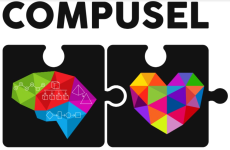INTRODUCTION
COMPUSEL project (Computational Thinking in Enhancing Primary Students’ Social-Emotional Learning Skills) is an EU-funded Erasmus+ KA220 project that aims to improve primary students’ social-emotional skills through using computational thinking and training primary school teachers for this purpose. Social-emotional skills are widely recognized by educators and other stakeholders throughout the world. They are accepted as critical for students to help them learn effectively as well as to develop crucial life skills. Accordingly, it is important that these skills are an integral part of education.
The project consortium was established through the involvement of Çanakkale Onsekiz Mart University, Izmir Democracy University, University of Bucharest, University of Evora, University of Lodz and Social Cooperative of Cyclades.
Social-emotional learning is defined as ‘the process through which all young people and adults acquire and apply the knowledge, skills, and attitudes to develop healthy identities, manage emotions and achieve personal and collective goals, feel and show empathy for others, establish and maintain supportive relationships, and make responsible and caring decisions’ (CASEL, 2022). Accordingly, social-emotional skills play a prominent role in children’s development. Besides, students who have developed social-emotional skills are equipped to take advantage of positive classroom environments that contribute to their academic growth. Developing students’ social-emotional skills improve their academic achievement, classroom behaviour and attitudes about themselves and others (Durlak et al. 2011).
In Europe, school curricula have introduced social-emotional learning in many countries in recent years. A close examination of these implementations revealed that they can be considered in two dimensions. One of these dimensions is the implementation of international social-emotional learning programs by adapting them to European countries, and the other dimension is the programs developed specifically for the European country to be implemented. However, although many programs introduced to improve students’ social-emotional skills, many students are still dealing with social-emotional problems at school age. Besides, although the importance of social-emotional learning has been recognized in European countries, social-emotional learning is not yet seen as the main curriculum area (Cefai, Bartolo, Cavioni & Downes, 2018). Accordingly, it is recommended that, with adequate resources, it should become a core aspect of the curriculum in European countries. Furthermore, the need for social-emotional education that is culturally responsive to the European context is also pointed out. Therefore, COMPUSEL designed a new and state-of-the-art curriculum for improving European students’ social and emotional learning skills. The curriculum considered European students’ characteristics.
During the curriculum development process, the project consortium has focused on computational thinking as a creative approach to solve complex social-emotional problems. Computational thinking can be defined as a process that breaks down a problem into simple steps so that complex problems become more manageable. It is a powerful problem-solving technique that enables us to deal with complex problems. It involved four different steps. They are named: Decomposition, Abstraction, Pattern Recognition and Algorithmic Thinking.

Figure 1 – Computational Thinking Skills
These phases help students to break down a complex problem into smaller parts, to understand the problem in a more detailed way and develop a solution to the problem systematically. Integrating computational thinking into social-emotional learning will provide an opportunity for students to tackle complex challenges in all aspects of their lives.
Covid 19 pandemic has brought changes and challenges into our children’s lives regarding social-emotional learning. Since their daily routine has changed, many of them have been struggling with social isolation, the difficulties of learning remotely or other problems raised throughout the pandemic. This led us to update existing approaches to social-emotional learning and also develop a curriculum for the post-pandemic period.
GENERAL AIMS OF THE CURRICULUM
COMPUSEL aims to improve primary school students’ social-emotional skills and train teachers for this purpose. It aims to develop students’ social-emotional skills through challenges focuses on self-awareness, self-management, social awareness, relationship, or responsible decision-making. Accordingly, students will be able to,
● understand their own emotions, thoughts, and values as well as the way these influence their actions.
● regulate and control their own emotions, thoughts, and behaviours.
● understand and build empathy with others including other diverse individuals and groups.
● establish and maintain healthy relationships.
● make positive and constructive choices based on individual and social factors.
COMPUSEL will also support teachers to help their students,
● to strive for success by developing their social-emotional learning skills.
● regarding full social inclusion.
Social-emotional learning skills are an integral part of human development. By integrating computational thinking skills and digital stories in the teaching of social-emotional learning, COMPUSEL will enable students to structure problems so they can be solved. Developing social-emotional skills in the primary school period leads students to internalize these skills which makes a significant difference in students’ success in school and life.

